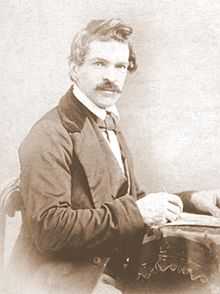Charles Christian Nahl

Carl Christian Heinrich Nahl (October 18, 1818 – March 1, 1878), later known as Charles Nahl, and sometimes Karl Nahl, Charles Christian Nahl or Charles C. Nahl, was a German-born painter who is called California's first significant artist.[1]
Early years
He was the son of Georg Valentin Friedrich Nahl (1791–1857) and Henriette (Weickh) Nahl (1796–1863). His parents divorced in 1826. He came from a long line of artists and sculptors. His great-grandfather was Johann August Nahl, the German sculptor and stuccist.
Nahl was trained at the Cassel Academy.
Career
Unease over the political state of Hesse led him and his friend Frederick August Wenderoth (1819–1884) to Paris in 1846, where he enjoyed some success at the salon and changed his name to "Charles".[2] The February Revolution prompted another move with his mother and siblings, including half-brother Hugo Wilhelm Arthur Nahl (1833–1889) to Brooklyn, New York, where they heard of the gold strike. He arrived in Nevada City, California the next year, and then moved to Rough and Ready, California.[3] Here, he purchased a "salted" mine. Having no luck along the Yuba River, Nahl and Hugo opened a studio with Wenderoth in Sacramento, moving to San Francisco after the 1852 Sacramento fire. (illustrated by Arthur).
Olympic Club
The Nahl brothers were fine athletes. At their home in San Francisco's Bush Street, their backyard gymnasium served as the early version of the Olympic Club and was its headquarters during the period of 1855 to 1860. At his brother's suggestion, it was named the "San Francisco Olympic Club" and, at the club's inaugural meeting on May 6, 1860, his brother Arthur was elected its Leader.[4]
Selected gallery
-

Incident on the Chagres River (1850), now in the Bancroft Library
-

Little Miss San Francisco (1853)
co-work with Wenderoth
Collection of the Oakland Museum -

Sacramento Indian with Dogs (1857)
-

The Rape Of The Sabines - The Invasion (1871)
References
- ↑ Matthew Baigell
- ↑ Palmquist, Peter E.; Thomas R. Kailbourn (2000). Pioneer photographers of the far west: a biographical dictionary, 1840-1865. Stanford University Press. pp. 415–417. ISBN 0-8047-3883-1.
- ↑ Comstock, David A. (January 2010). "Gold Rush Art and Wood Engraving". Bulletin (Nevada City, California: Nevada County Historical Society) 29 (1): 4.
- ↑ Janssen, Frederick William (1888). A history of American amateur athletics and aquatics: with the records (Digitized Mar 9, 2010 ed.). Outing Co. p. 131.
External links
| Wikimedia Commons has media related to Charles Christian Nahl. |
- Watercolor galery of the Los Angeles County Museum of Art
- link collection on Artcyclopedia
- Romans and Sabines Crocker Art Museum online
- Charles Christian Nahl at Find a Grave
|